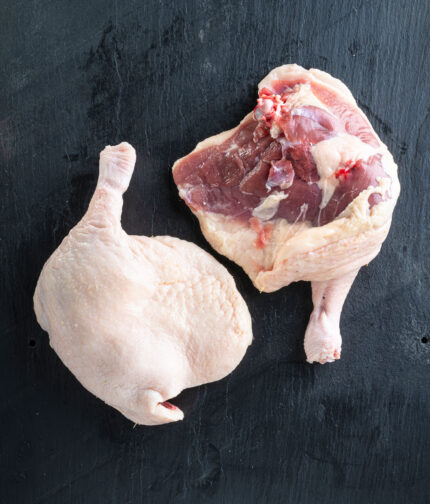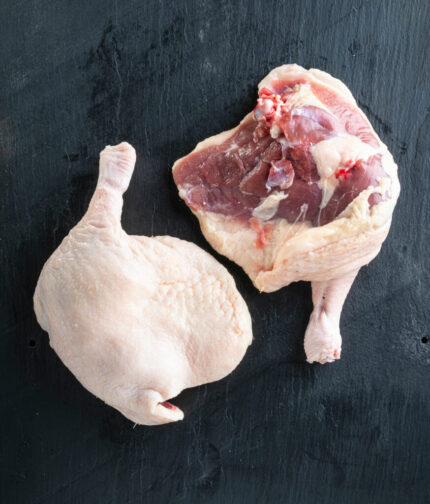Four individual 4 oz. glass jars of Kosher Rendered Duck Fat for sautéing vegetables, roasting potatoes or French Fries, or as gourmet substitute in place of butter or oil. Duck Fat adds a great amount of depth and flavor to your finest dishes.
Jurgielewicz & Pelleh Poultry Partnership
This product began its journey as a Pekin duck, humanely raised without hormones or antibiotics on the Jurgielewicz Farm. Joe Jurgielewicz & Son Ltd. is a fourth generation family-owned Pekin duck farm located in Hamburg, PA. The original farm was founded in 1933 in Moriches Bay, Long Island and opened on its present site in 1984. Today, the farm is owned and operated by its CEO, Dr. Joe Jurgielewicz, a Cornell University-educated veterinarian.
Jurgielewicz premium ducks are prized by the finest restaurants and chefs across America for their succulent flavor, perfect meat-to-fat ratio and nearly flawless skin. In partnering with Pelleh Poultry, Jurgielewicz now offers its restaurant-quality ducks and duck products to the fast-growing kosher market.
For over 25 years, Pelleh Poultry – a small, family-owned abattoir under the stringent hashgacha of Harav Dovid Miller, Shlita- has been providing direct farm-to-home delivery to discerning kosher consumers. We hope you enjoy them all.
Eliezer Franklin and the Pelleh family.
Creating clear and transparent shipping and handling policies is crucial for a commodity trading company like Agropastoral Products Co., Ltd. Here's a framework for the Shipping and Handling Policy:
1. Shipping Policy:
a. Shipping Process: - Detail the steps involved in the shipping process, from order placement to delivery.
b. Shipping Rates: - Specify the shipping costs associated with various products or order amounts.
c. Delivery Timeframe: - Provide estimated delivery times based on location and shipping method.
d. Shipping Carriers: - Name the shipping carriers used and any partnerships that may influence shipping.
e. International Shipping: - Explain international shipping options, rates, and potential customs or import duties.
f. Tracking Information: - Describe how customers can track their orders and obtain tracking information.
g. Shipping Restrictions: - List any countries, regions, or products where shipping may be restricted or limited.
2. Handling Policy:
a. Packaging: - Describe how products are packaged to ensure safe transit and delivery.
b. Quality Assurance: - Explain any quality control measures or checks in place during the handling process.
c. Fragile Items: - Provide special handling instructions for fragile or delicate commodities.
d. Inventory Management: - Detail how inventory is managed to maintain accuracy and prevent errors in order fulfillment.
e. Returns and Exchanges: - Outline the process for handling returns, exchanges, or replacements related to shipping issues or damaged items.
3. Additional Policies:
a. Lost or Damaged Items: - Explain the procedure for reporting and addressing lost or damaged items during shipping.
b. Split Shipments: - Describe under what circumstances the company may split an order into multiple shipments and how this is communicated to the customer.
c. Free Shipping Offers: - Clarify conditions for free shipping, such as minimum order amounts or specific products.
d. Holiday or Peak Season Shipping: - Provide information about any special considerations or delays during peak seasons or holidays.
e. Force Majeure: - Address how the company handles unforeseen events like natural disasters, strikes, or other force majeure events affecting shipping and delivery.
f. Contact Information: - Provide contact details for customers to reach out for shipping-related queries, concerns, or support.
Regularly update and review these policies to ensure they align with your company's operations and any changes in shipping or handling processes. Communicating these policies clearly to your customers will help manage their expectations and provide a positive shopping experience.


















Reviews
There are no reviews yet.